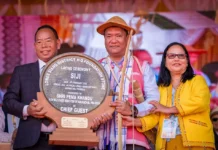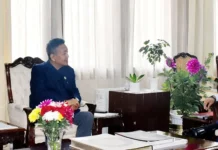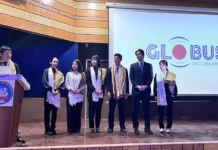Staff Reporter
ITANAGAR, 12 Dec: Against the background of the upcoming Arunachal Pradesh Public Service Combined Competitive Examination (APPSCCE) prelims, which is being conducted on 15 December, the Arunachal Frontier Tribal Front (AFTF) has demanded immediate repeal of the 80:20 ratio for appearing in exams conducted by the Arunachal Pradesh Public Service Commission (APPSC) and the Arunachal Pradesh Staff Selection Board(APSSB), and demanded that there be mandatory requirement of permanent residence certificate (PRC) and ST certificate for one to sit for such exams.
Addressing mediaper-sons at the press club here on Thursday, AFTF chairman Tadak Nalo said that the 80:20 ratio is being implemented in Arunachal Pradesh despite its being a tribal state.
“There is no safeguard for the indigenous tribal inhabitants of the state. Arunachal Pradesh is the only tribal state where a non-APST has topped the state’s most prestigious examination, that is the APPSCCE,2021,” Nalo said.
He said that producing PRC and domicile certificate is mandatory for appearing in public service commission examinations in states like Mizoram, Nagaland and Assam, but there is no such requirement in Arunachal.
“The 80:20 criterion began in 1990 vide a notification (No OM 13/90, dated Itanagar, 24 September, 1990) issued by the state’s organisation and methods department owing to the then existing geopolitical, socio-cultural and economic circumstances. However, more than three decades have passed since then, and the time has come to make necessary changes to it,” Nalo said.
He highlighted that, while the tribal population’s need for jobs has increased, the opportunities have shrunk over the years. “Considering the present context, the 80:20 criterion in the recruitment process needs to be revisited, reviewed and revised,” he said.
The AFTF demanded the repeal of the ratio in the upcoming APPSCCE prelims, and said that production of ST and PR certificates be made mandatory for a candidate to appear for the exam.
It also demanded introducing a tribal language/dialect in such exams.



